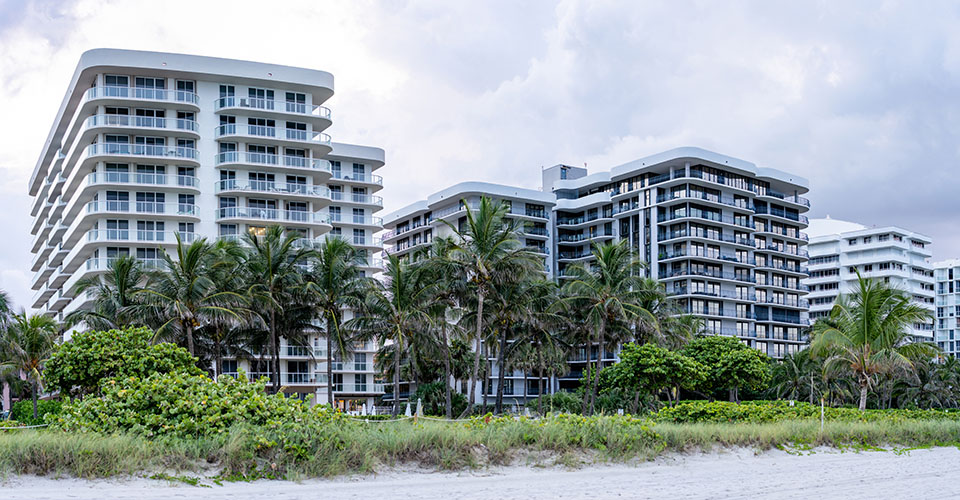The Orlando Law Group
Milestone Inspection Lawyer Florida
Florida is planning to inspect all older multi-story residential buildings. It is essential for residents and management associations to understand their options.
Called “Milestone Inspections,” nearly a million buildings in Florida will need to be inspected, including all buildings built before July 1, 1992.
The first step in your Milestone Inspections will be to order a phase one inspection through a licensed engineer. This is the minimum inspection required for buildings older than 30 years through the state. The findings of this inspection are basic in nature, and if cause is found, a “phase two” inspection will be ordered.
Having your legal team involved is crucial at this point. The Orlando Law Group can collaborate with your engineers to identify building issues and establish fault.
Without a legal team in place, it could be you and your fellow residents facing millions of dollars of out-of-pocket expenses to ensure your residence is safe.
Your Questions About Milestone Inspections
Why is this an issue?
After the horrific events around the Surfside building collapse, the Florida Legislature took action to ensure a tragedy like this never occurred again and passed new legislation requiring inspections of older, multi-story residential buildings and their structural conditions.
What buildings are required to be inspected?
This new legislation specifically requires residential buildings taller than two stories to be inspected if they are more than 30 years old. If they are within three miles of the ocean, the requirement is more than 20 years old.
When must these inspections be complete?
The legislature is requiring all buildings to be complete by the end of 2024, leading to the concept of milestone inspections.
What exactly is a "Milestone Inspection?"
The legislature has deemed all such inspections as “Milestone Inspections.” This is a general term for the different phases of inspections that are now required at specific milestones of a building’s life.
What is involved in Phase One of the Milestone Inspection?
According to the legislation, a visual examination of habitable and nonhabitable areas of a building, including the major structural components of a building, provides a qualitative assessment of the structural conditions of the building. Surface imperfections such as cracks, distortion, sagging, deflections, misalignment, signs of leakage, or peeling of finishes are not considered signs of structural distress unless the architect or engineer performing the inspection determines that such surface imperfections are a sign of structural distress.
What is Phase Two of the Milestone Inspection?
According to the new law, A phase two inspection may involve destructive or nondestructive testing at the inspector’s direction. The inspection may be as extensive or as limited as necessary to fully assess areas of structural distress in order to confirm that the building is structurally sound and safe for its intended use and to recommend a program for thoroughly assessing and repairing distressed and damaged portions of the building.
Does every building need a phase two milestone inspection?
If the expert conducting the phase one inspection finds no issue, a phase two inspection will not be needed.
What is the role of Orlando Law Group with my Milestone Inspections?
We work for you and/or your association, ensuring your rights are maintained. If there are issues with your building, we’ll work with the experts to accurately determine any fault by others, like construction defects, bad designs or other issues, and work to ensure those liable are held accountable.
Why Work With Us?
The Orlando Law Group will work for you and your association, ensuring your rights are maintained.
If there are issues with your building, we’ll work with the experts to accurately determine any fault by others, like construction defects, bad designs or other issues, and work to ensure those liable are held accountable.
For More Information on Milestone Inspections:
Discuss your case with us
or call us
(407) 512-4394
Locations
Law Offices Near You
Altamonte Springs
940 Centre Circle
Suite 3002
Altamonte Springs, FL 32714
Phone: (407) 982-7252
Hunters Creek
14115 Town Loop Blvd, Suite 300
Orlando, FL 32837
Phone: (407) 512-4394
Waterford Lakes
12301 Lake Underhill Road
Suite #213
Orlando, FL 32828
Phone: (407) 512-4394
Winter Garden
12200 West Colonial Drive
Suite #100
Winter Garden, FL 34787
Phone: (407) 955-4848
Law Practice Areas
Bankruptcy Law
Business Law
Elder Law
Family Law
Guardianships
HOA & COA Representation
Immigration Law
Litigation
Misdemeanor Criminal and Criminal Traffic
Personal Injury Law
Probate Law
Real Estate Law
Social Security Disability
Special Needs and Education
IEPs and School Law
Trusts, Wills and Estate Planning
Veterans Law




 Jeffrey W. Smith
Attorney
Jeffrey W. Smith
Attorney

 Dan Sanders
Attorney
Dan Sanders
Attorney
 Wendy Hernandez O’Donnell
Attorney
Wendy Hernandez O’Donnell
Attorney









